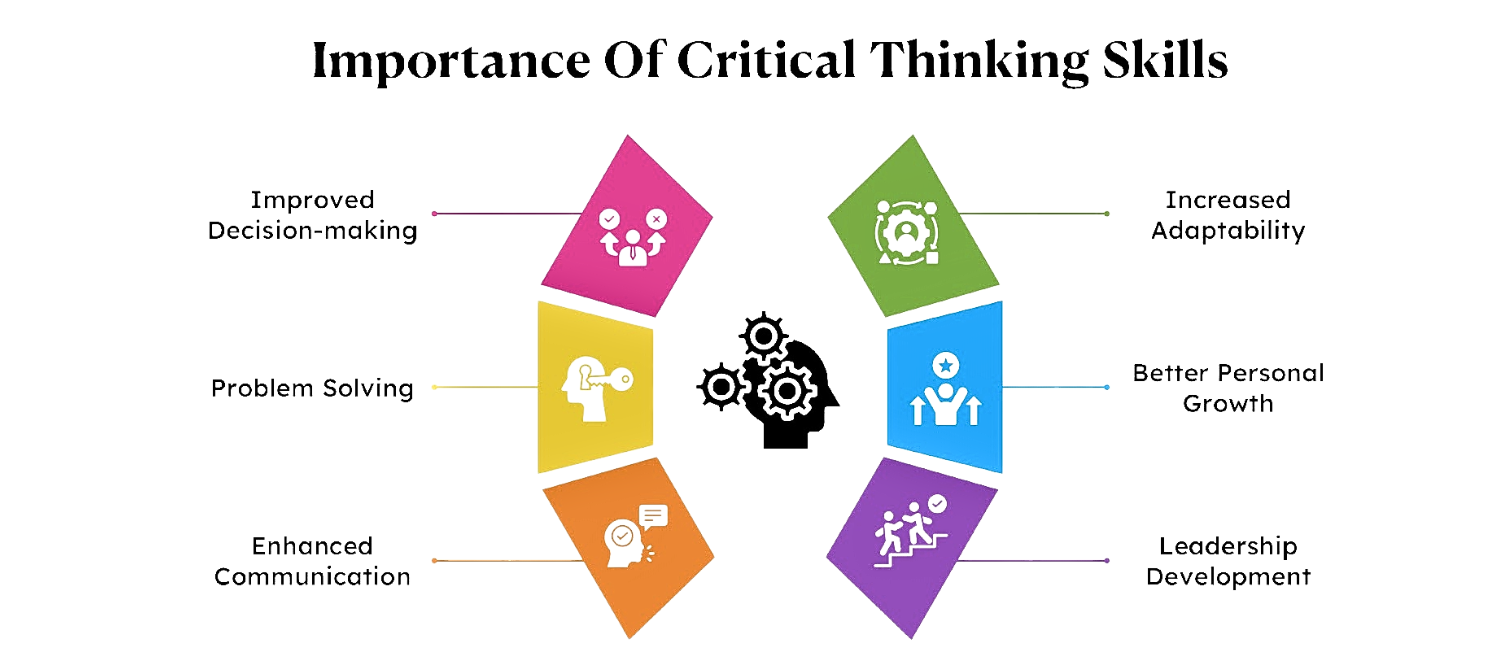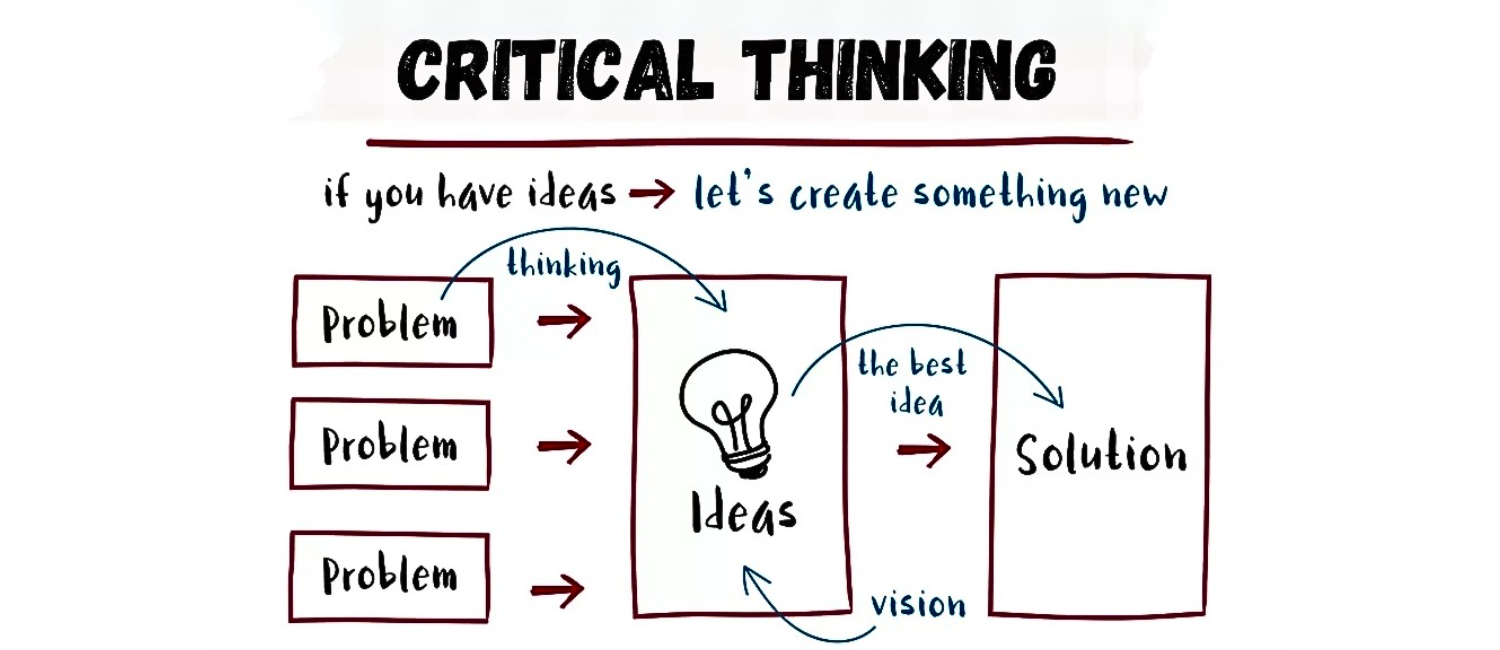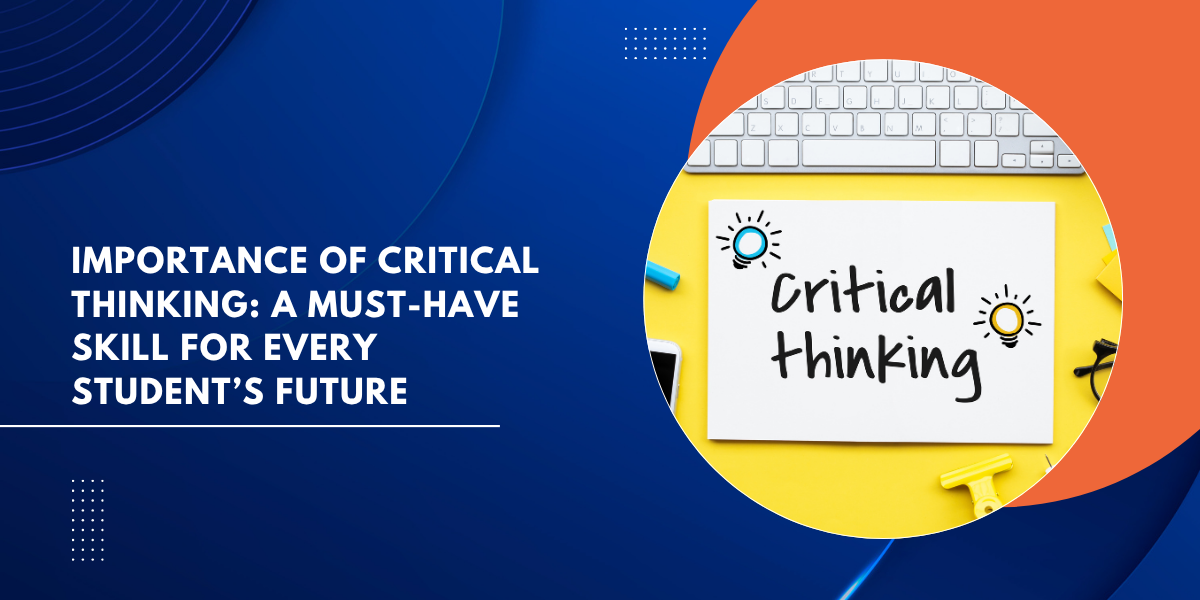Picture this — your child is sitting in an exam hall. The clock is ticking. They turn the page and come across a question they’ve never seen before. For a split second, panic flashes across their face. But then something shifts. They pause. They think it through. They connect the dots — and find their answer.
That moment of calm, confident thinking? That’s critical thinking at work.
In today’s world, it’s not just about how hard your child studies or how many hours they put in. It’s about how they approach problems, make decisions, and navigate a world full of choices and uncertainties. Whether it’s tackling competitive exams, choosing a career path, or simply managing day-to-day situations, the importance of critical thinking quietly shapes their success.
The best part? Critical thinking isn’t a gift some are born with. It’s a skill — one your child can develop with simple, everyday steps.
In this guide, let’s break down what critical thinking really means, why it’s so crucial for your child’s future, and how they can start building it from today.
What exactly is Critical Thinking?
Picture this — your child gets a message on WhatsApp. It claims some unbelievable facts or breaking news. Now, they could simply believe it and forward it. Or… they pause for a second and ask, “Is this even true?”
That small pause — that moment of questioning — is critical thinking at work.
It’s not about doubting everything. It’s about slowing down, asking smart questions, checking the facts, and seeing the bigger picture.
Whether it’s reading the news, scrolling through social media, solving a tricky math problem, or making big life choices, critical thinking helps your child stay sharp. It protects them from easy mistakes, builds confidence, and trains their mind to think clearly — a skill that stays with them far beyond the classroom.

Why is Critical Thinking Such a Big Deal for Students?
Let’s be honest — being a student today isn’t easy. There’s information flying at you from every direction — classes, social media, entrance exams, news, advice from relatives — and somewhere in the middle of all that, you’re expected to plan your entire future. It can feel overwhelming.
That’s exactly why building critical thinking matters so much — not just for academics, but for life beyond school.
In our work with hundreds of students, we’ve seen one thing clearly — those who sharpen their critical thinking skills don’t just score better in exams. They make smarter career choices. They avoid the confusion, detours, and regrets that so many face later.
Take Samanyu, for example. A commerce student who loved numbers but wasn’t sure if he should pick CA, management, or banking. Instead of rushing in, he paused, explored his options, asked the right questions — and realised his interest lay in finance analytics. That clarity came from thinking critically — not just following the crowd.
Whether it’s solving tricky questions, cracking interviews, or choosing the right career, critical thinking gives your child the confidence to make decisions they won’t regret later.
How Critical Thinking Prepares You for Real-Life Challenges?
Life after school isn’t as simple as following a timetable. Out there, you’ll face situations where there’s no obvious right or wrong answer. Peer pressure, career decisions, even handling tricky conversations — they all demand one thing: clear, confident thinking.
That’s exactly where critical thinking becomes your biggest strength. It helps you pause, look at the problem from all sides, weigh your options, and make smart choices — without second-guessing yourself.
Let me tell you about Jeevith, a student I worked with. He was always sharp when it came to theory and facts. His marks were solid. But when he sat for his first group interview at a college fest, things changed. The questions weren’t from textbooks. They wanted opinions, real-life examples, and the ability to think on the spot. Jeevith froze. He realised that just knowing the answers wasn’t enough — applying them was the real challenge.
We spent time building his critical thinking — questioning assumptions, considering different viewpoints, and practising how to express his ideas clearly. Slowly but surely, his confidence grew. Today, Jeevith is pursuing engineering and even mentors juniors at his college — guiding them through the same challenges he once faced.
Critical thinking isn’t just a school skill — it’s career insurance. It prepares your child to handle real-world situations, tough decisions, and unexpected challenges — with clarity and confidence.
How Critical Thinking Builds Confidence and Independence?
Have you ever watched your child hesitate to make a simple choice — worried they’ll be wrong? Maybe it’s answering a question in class, picking subjects, or speaking their mind. That quiet hesitation? It’s more common than you think.
But here’s the good news — when your child learns to think critically, that fear slowly starts to fade. They begin to trust their own judgement. They stop second-guessing every decision. They learn how to pause, look at a situation, weigh the options, and arrive at a smart, confident conclusion.
That’s when real confidence kicks in. It shows up when they speak up in class, tackle tough assignments, or share their ideas in group discussions.
And the best part? It doesn’t stop at academics. Critical thinking quietly shapes their independence — how they handle friendships, make career choices, and deal with real-life situations. It turns hesitation into confidence. Uncertainty into clarity.
Let me explain how.
How Critical Thinking Builds Real-World Skills?
Critical thinking isn’t just about handling tricky exam questions. It quietly shapes some of the most important life skills your child will use — in school, in future careers, and in everyday life. Here’s how:
- Sharpens Communication
Good communication isn’t about fancy words. It’s about making your point clear, explaining ideas confidently, and knowing how to listen.
Like when your child structures their thoughts in a school debate, instead of rambling. - Boosts Problem-Solving
Life doesn’t always give easy answers. From picking the right stream to handling peer pressure, critical thinking helps break down problems and weigh options.
Like when they calmly figure out how to split expenses on a trip with friends. - Builds Decision-Making Skills
“Which course should I pick? Should I apply for that internship?” With critical thinking, your child learns to pause, ask smart questions, and make well-thought-out choices.
Like when they compare colleges — not just going by what everyone says, but truly considering what fits them. - Increases Confidence
When they trust their own reasoning, it shows. They’re less likely to follow the crowd or second-guess themselves.
Like when they share an opinion in a group project and stand by it, even if it’s different. - Future-Proofs Their Career
Employers today want people who can think on their feet, solve problems, and stay calm under pressure — no matter the profession.
Like when your child handles unexpected interview questions with ease, because they’ve learned to think, not just memorise.
Global reports keep listing critical thinking among the top skills for future careers. And the best part? Your child can start building it right now, with simple, everyday habits.
Helpful for Competitive Exams and Interviews
Whether it’s competitive exams like UPSC, CAT, SAT, or even regular aptitude tests, success depends on more than just memorising facts. These exams are designed to test how well you can analyse information, apply logic under pressure, and think critically.
That’s exactly where strong critical thinking gives your child an edge. It helps them break down complicated questions, spot hidden patterns, and stay calm — even when the paper feels tricky.
And when it comes to interviews, especially for competitive courses or job placements, the ability to think on your feet makes all the difference.
Imagine an interviewer asks: “Why do you think this company should hire you?”
A child with strong critical thinking doesn’t just recite memorised lines. They pause, reflect, and connect their strengths to what the company needs — right there, on the spot. That confidence and clarity stand out.
Over the years, I’ve seen students with excellent academic records fumble in interviews simply because they couldn’t structure their thoughts or explain their reasoning. On the other hand, those who’ve worked on critical thinking tend to stay composed, speak clearly, and impress interviewers with how they approach problems.
It’s another reason why critical thinking isn’t just for exams — it’s a life-long skill every student needs to build for real career success.
Everyday Life Becomes Simpler
From managing money to making relationship choices, critical thinking helps your child slow down, weigh their options, and avoid rushing into decisions.
Whether it’s comparing colleges, deciding on a gadget, or even managing friendship dilemmas — critical thinking helps them pause before leaping.
Take higher studies, for example. Instead of blindly following what everyone else is doing, your child learns to ask — “Is this course really right for me? What are my long-term goals?” That small habit of questioning can save them from regrets later.
Even in everyday situations — tricky social situations, confusing advice from others, or online information overload — critical thinking becomes like a mental filter. It helps your child:
✔️ Make thoughtful, informed choices
✔️ Spot misinformation or misleading advice
✔️ Solve daily problems calmly and practically
It’s what keeps life from feeling chaotic. With critical thinking, your child feels more aware, more confident — and life genuinely becomes a lot smoother.
How to Know If You Need to Strengthen Your Critical Thinking?
Let me ask you a few simple questions — just answer them honestly in your mind:
- Do you often accept information as true without questioning it?
- Do you feel stuck when problems don’t have obvious answers?
- Do you struggle to explain why you think the way you do?
- Do you avoid making decisions because you’re afraid of being wrong?
If even one of these made you nod — good news, this is a skill you can start building today.
Critical thinking isn’t something you’re either born with or not. It’s just like playing cricket or learning music — the more you practise, the stronger it gets. And with time, it quietly makes studies, decisions, and even life feel a lot more manageable.

How Can You Start Improving Your Critical Thinking?
The first step is awareness. The second? Tiny daily tweaks to build a giant skill. Small, simple actions in your everyday routine can quietly strengthen your critical thinking over time. Here’s how:
- Get Curious — Ask More Questions
Whenever you hear or read something, pause for a second. Don’t just accept it. Ask:
- Why is this true?
- Where’s the proof?
- Is there another way to look at this?
This simple habit trains your brain to stay sharp, question assumptions, and avoid blindly following others.
- Don’t Be Afraid of Mistakes
Many students hold back from questioning things because they fear being wrong. But here’s the secret — mistakes are how you learn. Some of the greatest scientists and inventors built their success by questioning the obvious… getting it wrong… and trying again.
The more you approach problems with curiosity instead of fear, the stronger your critical thinking gets.
- Talk, Debate, Discuss
Conversations are one of the best classrooms. Whether it’s with friends, family, or teachers — discuss topics beyond your textbooks. Debates, friendly disagreements, and sharing opinions teach you how to express your ideas clearly and think on your feet. - Exercise Your Brain with Puzzles
Puzzles and brain games aren’t just for fun — they stretch your mind. Sudoku, logic puzzles, riddles, chess — all these challenge you to think in new, flexible ways and strengthen your problem-solving abilities.
Real-Life Example: How Deepa Built Her Confidence?
Let me tell you about Deepa, a Class 11 student I once worked with. Deepa was bright, but she struggled with overthinking. Even small decisions — like choosing subjects or preparing for tests — would stress her out. She often relied on her parents or teachers to decide for her.
But over time, Deepa made small, simple changes. She started questioning things more, spoke up during class discussions, and made brain teasers a regular part of her routine. Slowly, she noticed a difference.
Today, Deepa doesn’t panic when tricky questions show up. She breaks them down calmly, weighs her options, and explains her reasoning clearly — not just in studies, but in everyday life too.
As Deepa puts it herself, “I finally feel like I can trust my own brain.”
What Can Parents Do to Help Their Child Build Critical Thinking?
As a career mentor, I often meet parents who say, “My child memorises well, but when it comes to applying knowledge, they freeze.” It’s a common worry. But the solution isn’t more tuition classes — it’s creating a home environment that builds thinking skills, gently and consistently.
Here’s how you can help — without adding pressure:
- Encourage Questions, Even the Difficult Ones
When your child asks, “Why does this happen?” or “Could there be another way?” — don’t dismiss it. Engage with their curiosity. If you don’t know the answer, explore it together. That shows them it’s okay to be curious and uncertain. - Involve Them in Everyday Decisions
Simple choices — planning a family trip, comparing products before buying, budgeting — are hidden opportunities to build critical thinking. Ask for their opinion, guide them to weigh pros and cons, and help them make thoughtful decisions. - Don’t Punish Mistakes — Celebrate the Learning
If your child makes a wrong choice or struggles with problem-solving, avoid scolding them. Instead, calmly discuss what went wrong and how they can approach it differently next time. That builds resilience, confidence, and the courage to think independently. - Model Critical Thinking Yourself
Children learn by watching. When you face challenges, let them see how you stay calm, question information, and make careful decisions. Your example shapes their habits far more than any lecture ever will.
As a parent, you are the first coach. The questions you encourage, the calm you show when mistakes happen — that’s what builds lifelong thinkers.
The Role of Schools in Shaping Critical Thinkers
When we talk about building critical thinking in students, it’s not just a home project — schools play a huge role too. But here’s the thing — it can’t be treated like an optional extra.
Just like with extracurricular activities, schools need to weave critical thinking into the everyday learning experience — through open discussions, debates, and encouraging students to question and explore.
And if your child’s school isn’t fostering open discussions or healthy debates yet, bring it up. You’d be surprised how a simple question from a parent can spark change.
After all, when both home and school environments encourage curiosity and clear thinking, students naturally grow into confident, independent decision-makers.
A school that truly values critical thinking will:
- Encourage open discussions and healthy debates in classrooms
- Focus on application-based learning, not just rote memorisation
- Train teachers to ask thought-provoking questions, not just deliver content
- Create a safe space where students aren’t afraid to ask questions or make mistakes
- Introduce activities like group projects, brainstorming sessions, and problem-solving tasks as part of regular learning
If your child’s school isn’t doing this yet, don’t hesitate to bring it up during your next parent-teacher meeting.
A simple question like, “How do you help students build real-world thinking skills beyond textbooks?” can spark important changes. After all, schools and parents need to work together to raise not just well-informed students — but thoughtful, capable individuals.
Final Thoughts: Small Steps Towards Smarter Thinking
If there’s one thing I’d love for you to take away from this — it’s that critical thinking isn’t reserved for adults, toppers, or professionals. It’s for every student, every parent, and honestly, anyone preparing for the real world.
The earlier you start building this skill, the less overwhelming your academic journey feels. But more importantly, it prepares you for life beyond exams — where smart, calm thinking often matters more than memorised answers.
You don’t need fancy courses or extra tuition for this. Start small. Ask more questions. Be curious about the world. Don’t be afraid to pause and think before making decisions. Over time, you’ll notice the difference in your studies, your confidence, and how you approach life’s challenges.
Want to see how your child’s critical thinking stacks up — and how it could shape their career choices?
One small step today can build a sharper, calmer tomorrow.
At NextMovez, we do more than just career counselling. We help students discover their unique strengths, sharpen essential life skills like critical thinking, and make confident, informed choices — in academics and beyond.






















